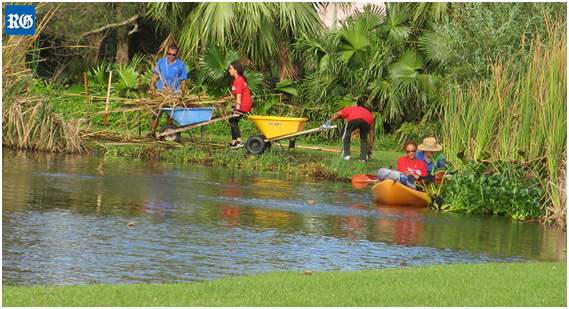Recent News
BAMZ Releases Ten Rehabilitated LongtailsWednesday, September 11, 2013
Since July, the Bermuda Aquarium, Museum & Zoo [BAMZ] has had 15 longtails brought in for rehabilitation, thanks to calls from the public, including three adults and 12 chicks. To date, 10 have already been released, and one will be released soon
Reef Watch set to become an annual event
Tuesday, September 10, 2013
Over 100 people participated in the first ever Reef Watch hosted by the Bermuda Zoological Society that raised more than $21,000 for reef conservation awareness
Recently Held “Reef Watch” Hailed A Success
Friday, September 06, 2013
On Saturday [Aug 31], 21 boats made their way to over 40 reef sites around the island to take survey of the state of the coral, color and quantity of specific types of fish.
Reef Watch was fun and useful… …and volunteers are wanted all year round
Friday, September 06, 2013
Who knew that armed with just mask, snorkel, clipboard and a hula-hoop you can become a citizen scientist?
Reef Watch raise more than $15k
Wednesday, September 04, 2013
The inaugural Reef Watch citizen science research and awareness drive on Saturday has so far so far raised some $15k.
About
GovernanceAbout Us
Newsletter
Latest News
Gift & Bookstore
Contact
General Inquiries
info@bzs.bm
Latest News
All the latest updates and news from the Bermuda Aquarium, Museum, and Zoo, one of Bermuda's leading visitor attractions!
Jonathan Bell
Published Jan 16, 2018 at 8:00 am (Updated Jan 16, 2018 at 6:41 am)

HSBC volunteers help a Bermuda Zoological society team clean up
Cloverdale Pond in Smith's (Photograph supplied)
Two ponds have been cleaned up courtesy of an island conservation programme.
Cloverdale Pond in Smith’s and Southampton’s Evan’s Pond, a refuge for endangered species, were improved through the Bermuda Zoological Society’s wetlands remediation programme.
The scheme, which became the HSBC global water programme for Bermuda in 2014, was designed to remove toxic petroleum compounds from ponds.
The build-up of the poisonous hydrocarbons is a threat to the island’s two endemic killifish species, as well as native diamondback terrapins, which are a protected species.
The compounds, which come from oil, water runoff and vehicle exhausts, can be broken down by bacteria when the pond sediments are aerated.
The two-year grant from HSBC allowed the proposal to be tested in the field.
Volunteers also took part, with help from the Department of Environment and Natural Resources.
The BZS said Cloverdale was chosen first because of its small size, its “known severe effects on wildlife” and the absence of protected species in the water.
Evan’s Pond was selected as the second test site because of its small population of killifish.
The ponds were divided into sections and aerated for six to eight hours a day with solar powered compressors.
Hydrocarbon levels saw a major reduction over the course of a year.
The next site for remediation is the South Pond at the Mid Ocean golf course, where the hatching of diamondback terrapins has been hampered by pollution.


